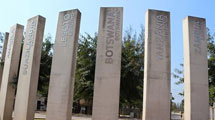By Sipho Mdanda
The Matola raid will always reverberate as one of the darkest hour our Freedom Fighters encountered when apartheid soldiers clandestinely entered Mozambique in the early hours in 30 January 1981 to murder 12 unsuspecting comrades. This incident was recounted by ANC President O.R (Oliver) Tambo as “there is no reason why this regime should be tolerated any more. Our resolve is a calm resolve... But let us rise like one man, as one people, to overthrow that regime”. With these words of encouragement, more freedom fighters were galvanised to escalate the demise of the apartheid rule.
After 34 years, both the South African and Mozambique governments will gather at the famous site on 11 September for the unveiling of the Motola Raid Memorial and the Interpretative Centre in Maputo. This gesture speaks to the unique Pan Africanism envisioned by Enock Sontonga the composer of ‘Nkosi’kelela I Afrika’; a prayer to the almighty to protect Africa and its children from the clutches of colonialism engulfing the continent. Sontonga did not single out South Africa, but embraced the entire continent in solidarity. Today both countries are free from the yoke of colonialism and enjoy thriving democracies enshrined in their constitutions.
Mozambique, just like many South African neighbours, played a pivotal role as gateway for freedom fighters to various camps where military training took place. The gallantry displayed by our freedom fighters and resilience of people of Mozambique in the quest for freedom has borne fruits. If the liberation route has to be honoured and understood in its holistic context, it is here in Matola that the story should be told. The youth of these two countries have to be educated about the price of freedom they enjoy through encouraging visits to the centre to learn about their shared history.
Questions of repatriation of human remains from sites outside South Africa have been addressed in the Mangaung report. It is a noble decision by the ruling party, and brings comfort to the long-grieving families. Indeed, governments develop policies to regulate and mediate on such issues, but the ultimate decision lies with families. Each family has to decide what is best for themselves, either to settle for ‘shared histories’ or to repatriate the remains of their loved one, a paradox to be mediated with caution.
On a national government perspective, this gesture symbolises solidarity with the people of Mozambique while ensuring social cohesion and national building for the South African peoples. This is prudent as both nations march gallantly to new challenges of improving the lives of their nationals. It is hoped that through the opening of this monument and interpretative centre, both countries’ citizens will learn the lessons cherished by freedom loving Mozambicans when they sheltered, at a high costs, the comrades fighting to liberate South Africa.
Let us hold hands and thank both the governments for preserving our heritage, reminding us that freedom was not free.
Sipho Mdanda is a curator at Freedom Park.





